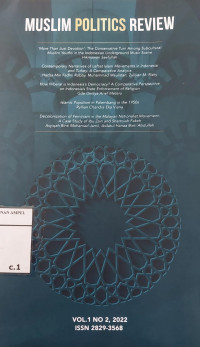
Artikel
How illiberal is Indonesia's democracy? A comparative perspective on Indonesia's state enforcement of religion
Penilaian
0,0
dari 5Recent appraisals of Indonesia’s political regime identify a deterioration of democratic quality, captured by a plethora of concepts such as democratic backsliding, democratic decline, and democratic regression. This deterioration compels scholars to conclude that Indonesia, in its current state, is an illiberal democracy, effectively displacing earlier optimism that Indonesian democracy will eventually be consolidated. This article engages the emerging literature on democratic decline and the rise of illiberal democracy in Indonesia by identifying a key source of its illiberal features. It makes the case linking Indonesia’s illiberal democracy with the involvement of the state in enforcing religion, as seen in the number of existing religious legislations. State enforcement of religion necessarily entails the curtailment of religious freedom, specifically freedom from religion, as the religiosity of Indonesian citizens is forced to shift from voluntary to compulsory. A liberal democracy, by definition, should not curtail individual liberty in general nor religious freedom in particular. This article then takes a comparative perspective on Indonesia by comparing the number of religious legislations in Indonesia with those of other democratic states, globally utilizing data from Religion and State (RAS) 3 and V-Dem dataset. The examination yields the observation that Indonesia has a far higher number of religious legislations than the average democracy globally. It indicates a significant level of involvement of the Indonesian state in enforcing religion. In that respect, Indonesia is unusually illiberal for a democracy. The article also emphasizes how religious legislations are mostly found in certain regions, and provides ethnographic evidence of how fasting as a religious norm is enforced during the month of Ramadan in South Kalimantan. This article concludes by reflecting on the uneven democratic quality at the subnational level. Decentralization and the uneven distribution of rights to subnational governments underlie the concentration of religious bylaws in only specific regions of the archipelago.
Ketersediaan
| Mus 01/02/2022-03 | J 297.272 Mus | Perpustakaan A. Yani | Tersedia namun tidak untuk dipinjamkan - No Loan |
Informasi Detail
- Judul Seri
-
-
- No. Panggil
-
J 297.272 Mus
- Penerbit
- Depok : UIII Press., 2022
- Deskripsi Fisik
-
22 hlm. 185-207; 26 cm.
- Bahasa
-
English
- ISBN/ISSN
-
2829-3568
- Klasifikasi
-
297.272
- Tipe Isi
-
-
- Tipe Media
-
-
- Tipe Pembawa
-
-
- Edisi
-
Muslim Politics Review, vol. 1, no. 2 Des 2022
- Subjek
- Info Detail Spesifik
-
-
- Pernyataan Tanggungjawab
-
-
Versi lain/terkait
Tidak tersedia versi lain
Lampiran Berkas
Komentar
Anda harus masuk sebelum memberikan komentar
 Karya Umum
Karya Umum  Filsafat
Filsafat  Agama
Agama  Ilmu-ilmu Sosial
Ilmu-ilmu Sosial  Bahasa
Bahasa  Ilmu-ilmu Murni
Ilmu-ilmu Murni  Ilmu-ilmu Terapan
Ilmu-ilmu Terapan  Kesenian, Hiburan, dan Olahraga
Kesenian, Hiburan, dan Olahraga  Kesusastraan
Kesusastraan  Geografi dan Sejarah
Geografi dan Sejarah